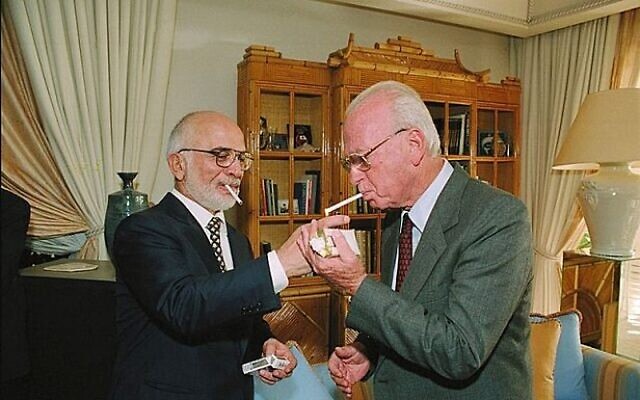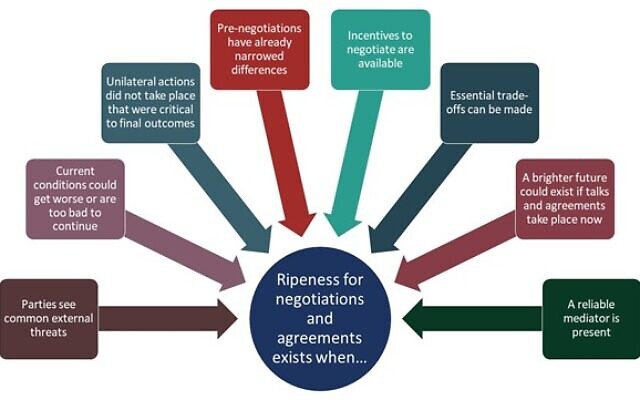History Suggests Palestinian-Israeli Negotiations are Not Ready
Professor Kenneth Stein of the Center for Israel Education shares his views on peace talks.

Elements Previously Present in Arab-Israeli Negotiation Successes
Nine pre-conditions that enabled Arab-Israeli negotiations to unfold successfully in the 1970s and 1990s are not present today. Egyptian-Israeli and Jordanian-Israeli agreements occurred because the respective sides wanted them and needed them.
Then there were no external cheerleaders demanding negotiated outcomes; today, it is the external cheerleaders who avidly hunger for an outbreak of Israeli-Palestinian talks. Former U.S. Ambassador to Israel Samuel Lewis said it numerous times, “outside parties cannot want an agreement more than the respective sides.” Why is both motivation and “ripeness” absent today?

the Center for Israel Education, www.israeled.org.
Previously, sovereign states negotiated with one another. Now, negotiations are to unfold between unequal parties: a national liberation movement in transition to state governance is to face a viable state that has a century’s worth of experience in self-governance and civic engagements. Exchanging land for peace then was dramatically different. Sinai’s return to Egypt did not have either the overwhelming strategic or emotional value that the West Bank possesses. Then there were clear delineations of what constituted Jordan, Israel and Egypt; neither Palestinians nor Israelis today are clear about what lands they do not want ultimately to control. Then there was one power center for Jordan, Egypt and Israel; Palestinians today are physically and politically divided into the Gaza Strip, the West Bank, Jerusalem, and among those in the diaspora that seek a voice.
Elements of Ripeness
Nine “ripeness” pre-requisites present then are neither evolving nor on interim horizons. Neither of the parties today share a common existential threat such as the Soviet Union or regional unrest that will drive them together. Some suggest that Palestinian existence is unbearable. Others fear that Israel cannot be both majority Jewish and democratic. Current conditions are not ideal, but tolerable. Unilateral actions by both sides restrain engagement in talks. While pre-negotiations have set down the final status issues and many details surrounding each – Jerusalem, settlements, borders, refugees and prerogatives of a Palestinian state – pre-negotiations have yet unfolded into realistic, serious and implementable outcomes.

Perhaps private negotiations have ensued between Jerusalem and Ramallah, but they have not yielded either the duration or trust that evolved between Jordan and Israel, or slowly between Egypt and Israel. Secret Israeli-Jordanian contacts went on for decades before Jordan’s King Hussein and Israel’s Prime Minister Yitzhak Rabin brought their private talks into the open in the early 1990s; each rarely doubted the other’s insincerity to end the state of war between them.
Both feared political instability emanating from Iraq and from Iran’s hegemonic Islamic radicalism. Both benefitted from financial rewards from Washington. Israel’s Prime Minister Menahem Begin and Egyptian President Anwar Sadat conducted private individual meetings with Romanian leaders and their emissaries met secretly in Morocco, unbeknownst in detail to the Carter administration and prior to Sadat’s visit to Jerusalem.
Trade-offs Present Then, Absent Now
Begin and Sadat understood that an agreement between them, exchanging sovereign Egyptian land in Sinai and Jewish settlements for a peace treaty, satisfied respective national interests. Each side relinquished something of critical value to the other. Israel traded land for peace. National, rather than ideological interests, motivated both countries.
Though financial, diplomatic and material incentives exist for Palestinians, it is not clear who will underwrite the annual costs for 10 years of $2 billion to $3 billion a year, necessary to undergird a Palestinian economy. A reliable umpire exists, though both Israel and the Palestinians strongly believe that the U.S., as mediator, tilts way too heavily to the other side. While the U.S. has a long-term security relationship with Israel, research has shown that the U.S. has spoken more publicly, frequently and consistently since 1967 on behalf of Palestinian self-determination and statehood than any other country. In January, the Biden administration announced its detailed outline for a two-state solution to resolve the conflict.
Returning to trade-offs, are the two communities truly prepared to make them? Who among the staunch advocates for the two-state solution and now in favor of a confederation of three states —Jordan, Israel and Palestine — honestly believes that the Palestinians would and should give up the dream of 1948 or 1967 Palestinian refugees not returning to what were Israel’s boundaries between 1949 and 1967? Israel in order to protect its eastern border must always ask the question: Would a brighter future exist for Jordan and for itself if there would be a Palestinian state between Jordan and Israel? Is a Palestinian state in the strategic interest of the United States?
As long as Israel’s political system depends upon a coalition of parties to govern, especially from those that demand Jewish presence in Judea and Samaria, no Israeli parliament will be able to vote to free itself of the West Banks’ encumbrances.
As long as critical elements within the Palestinian community articulate virulent anti-Israeli attitudes and call for Israel’s demise in school books, religious institutions and in media interviews, no Israeli parliamentary majority or leader will embrace serious negotiations. For Israel it also means a halt to delegitimization of Israel and Israelis in international institutions.
No amount of external cheerleading will generate ripeness. A choking presence of untrustworthy intentions cannot coexist with nitty-gritty negotiations. For negotiations to unfold, they must be scrubbed of hatred, clothed in proven sincerity, and oozing with trust. Not now. ì
Kenneth Stein is the founding president of the Center for Israel Education, www.israeled.org.



comments